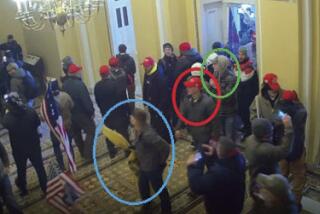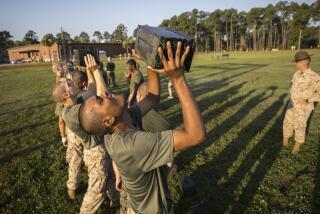Use in Embassies Questioned : Marines’ ‘Finest’: Young Men Living in Loneliness
- Share via
WASHINGTON — They are called “the best of our finest,” the elite of the Marine Corps.
But, today, with a growing sex-and-spy scandal centering on military guards at the U.S. Embassy in Moscow, serious questions are being raised about the decades-old practice of assigning young Marines to guard America’s most sensitive diplomatic installations abroad.
Although their size, their crew cuts and the colorful shorts they wear when running in almost any weather make them some of the most conspicuous Americans in Moscow, the embassy’s Marine guards are young men expected to lead exceptionally lonely and isolated lives.
They are consigned to the lowest rungs of the embassy social ladder and have limited contact with other members of the American community. Recreation consists chiefly of running, beer drinking, B movies in the embassy snack bar and a brutal version of ice hockey known as broomball. Permissible female companionship is largely limited to a handful of British and American “nannies” who care for the children of Western diplomats.
To thrust young, single men into such a bleak environment, some critics now suggest, is almost an open invitation to the kinds of problems that have produced a devastating breach of security at the most sensitive U.S. embassy in the world.
“Sexual entrapment is probably the most basic and earliest espionage technique,” said Robert Lamb, director of the State Department’s Bureau of Diplomatic Security. “And the Soviets have a particularly good intelligence service, and they can mount some especially sophisticated and clever operations.”
“Why should we use such men, some of whom are lacking in maturity, for what essentially is not a military role?” Sen. William S. Cohen (R-Me.), vice chairman of the Senate Intelligence Committee, asked in an interview Wednesday as he discussed hearings planned by the committee later this month.
House Armed Services Committee Chairman Les Aspin (D-Wis.) said Wednesday that his panel also would begin hearings on Friday on “obvious questions about the use of young Marines in sensitive locations.”
“We need to ask whether the Marines are the best source of security guards and we need to have a better picture of how these guards are picked, trained and supervised,” Aspin said.
Changes Expected
Even as congressional oversight hearings are being scheduled on whether the system contributed to the reported security breaches, the Defense and State departments are conducting separate inquiries into possible flaws in the system. “There are going to be changes--you can bet on that,” one Defense Department official said.
Two Marine guards, Sgt. Clayton J. Lonetree and Cpl. Arnold Bracy, have been charged with espionage for allegedly allowing KGB agents access to sensitive areas in the Moscow embassy after they became sexually involved with Soviet women.
And the former assistant commander of the embassy’s Marine detachment, Staff Sgt. Robert S. Stufflebeam, has been arrested and is being held in the brig at Camp Pendleton, Calif., on suspicion of having had unreported contacts with Soviet women, Pentagon officials disclosed Tuesday.
Sources close to the investigation have said that the security breaches enabled the Soviets to obtain the identities of virtually every Soviet contact for American intelligence agents in Moscow during that period. They have also been able to intercept and read virtually all the Moscow embassy’s coded communications to Washington for as long as a year, those sources have said.
Lonetree and Bracy, the first Marine embassy guards charged with espionage since the Marine guard program began in 1947, are being held in solitary confinement at the Marine base at Quantico, Va., where many of an estimated 15,000 Marines have been trained for embassy duty in the last 40 years.
“All candidates must be volunteers, must have a clear track record as Marines and must have a minimum score of 90 on their standardized armed forces examination,” said Capt. Craig Fisher, a Marine Corps information officer.
Rigorous Training
In describing the rigorous six-week training period for Marine guards, Fisher said: “There’s a lot crammed into this course.”
Included, he said, are courses in sentry and weapons training and in proper conduct in a foreign environment. He said that Marines are taught how to make security inspections at embassies and are drilled on the need to report any contacts by agents of a hostile country.
The training is so demanding, he said, that nearly one of every three students drops out before graduation. Of the thousands who have completed the training and been assigned to the more than 100 U.S. embassies around the world, only about 5% have ever been relieved of their duties, and those for “minor infractions,” he said.
Sen. Cohen said he was less troubled by the Marines’ training than by the use of Marines to perform so sensitive an assignment as protecting embassies in communist countries.
“These Marines are young, single men whom we’re asking to perform one of the most difficult of all assignments,” he said. “Young, unmarried men may be fine for warfare, but this isn’t . . . . We thrust them into a hostile environment where there is little social activity and little in the way of recreation, and these are very physical guys to begin with.”
The Marine guards have always been among the most visible Americans in the Soviet capital--and at the same time among the most isolated.
The Marines can be seen any day of the week, in off-duty hours, jogging near the embassy and along the sidewalks of the Ring Road, an inner “beltway,” centered on the Kremlin, on which the embassy is situated. Their personalized Marine security guard T-shirts, some in Cyrillic script, stand out in conspicuous contrast to the drab clothing of the Soviets they lope past.
Broomball Competition
The Marines loom large in an annual marathon in central Moscow, and in winter they form an awesome broomball team. Only the Finns take broomball, a bruising form of field hockey played on ice in sneakers, as seriously as the Marines--one or two of whom have been sent out of the country after altercations on the ice.
Besides running and broomball, off-duty activities for the young Marines in Moscow are limited. Unlike almost everyone else in the embassy and the rest of the American community, the Marines have essentially no chance to travel within the country.
Within the embassy, the Marines generally are regarded as at the lower end of the social pecking order, along with blue-collar technicians and communications specialists. Although they are not openly ostracized by the rest of the American community in Moscow, their youth, lower level of education and lack of association with the country around them inevitably set them apart from most other Americans there.
They are never seen, for instance, on the cocktail and dinner circuit that dominates the social life of most other Americans in the Soviet capital.
Rather, the Marines’ social life centers on the Marine bar, which they operate in off-duty hours in the embassy, and on “Uncle Sam’s,” the embassy snack bar, which, in the evenings, becomes a club that shows B-grade movies and serves beer, soft drinks and reasonable facsimiles of pizza and chili.
Few Female Companions
The pool of available (and permissible) female companions is limited mainly to a small number of young British and American women who spend a year or two in Moscow as nannies for the children of diplomats, businessmen and correspondents.
The combination of youth and social isolation evidently makes the Marines a special target for sexual entrapment schemes by Soviet intelligence agents.
The State Department’s Lamb said Wednesday that a number of Marines other than the three now in custody had reported sexual overtures from Soviet women. “I can’t give you a number. It’s a frequent occurrence,” Lamb told reporters.
Col. Carmine del Grosso, commander of the unit that trains and assigns embassy guards worldwide, said that the Marine Corps and State Department are considering assigning only married Marines to guard duty in the Soviet Union and 11 other sensitive countries, including China and Eastern European nations.
He said also that there is a possibility of shortening the length of the tour Marines serve in sensitive countries. It is currently 15 months.
Cohen, for one, is an advocate of shorter assignments.
“Having them serve for a year or more in a foreign environment may be too long, at least it is too long without enough R&R; breaks,” the senator said. “We should either have shorter terms or rotate them more. We need to find ways to help them cope with the stress of living in a hostile environment and give them tight supervision.”
Staff writers Robert Gillette and Robert C. Toth contributed to this story.
More to Read
Sign up for Essential California
The most important California stories and recommendations in your inbox every morning.
You may occasionally receive promotional content from the Los Angeles Times.








